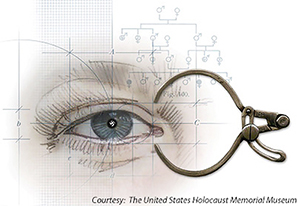Holocaust Genocide and Contemporary Bioethics Program 2016
 Promoting education, scholarship and community engagement on the lessons of the Holocaust for health care and society.
Promoting education, scholarship and community engagement on the lessons of the Holocaust for health care and society.
Our mission is to inspire and guide health professionals so that they practice with competence, compassion, respect and justice and uphold their duty to protect patients. We serve as a resource for scholarship on the legacy of the Holocaust for contemporary healthcare and society and seek to create lasting partnerships between the Center for Bioethics and Humanities and like-minded community organizations. Listen to an interview with Matthew Wynia, MD, on Colorado Public Radio and read an article in the Aurora Sentinal.
2016 Inaugural Events:
In May 2016, we hosted Art Caplan, PhD, a leading
American bioethicist and author of the landmark book,
When Medicine Went Mad: Bioethics and the Holocaust.
Click to view Dr. Caplan's presentation, "How did German
researchers in the camps go so wrong?"
Following his lecture, Dr. Caplan particpated in a panel discussion at the Fulginiti Pavilion focused on "Why don't we teach about the participation of health professionals in the Holocaust?" with Matthew Wynia, MD, MPH, Director of the Center for Bioethics and Humanities and Sheldon Rubenfeld, MD from Baylor College of Medicine. A community presentation by Dr. Caplan on "The Use and Misuse of the Nazi Analogy in American Politics," was held that evening at the Wolf Theater in Denver. Read about these events in CU Anschutz Today.
View the PBS Colorado State of Mind interview, "How the Holocaust Still Echoes Today in Bioethics," with Matthew Wynia, MD, MPH and Art Caplan, PhD, recorded on May 2nd, 2016. And read the CU Medicine Today article, "Teaching Medical Ethics and the Holocaust," in their May, 2016 edition.
ISWASWILLBE-The Holocaust Series: Paintings by Geoffrey Laurence
This thought-provoking exhibit was on display at the Art Gallery at Fulginiti Pavilion, from April 3-August 12, 2016. The exhibit was co-sponsored by the Mizel Museum, Denver.
Get involved in our programming
- Donate to the William S. Silvers, MD, Holocaust Genocide Contemporary Bioethics Program Fund
to support current programming and ensure the future of this program. - Join our Planning Committee to help develop future events.
- For information about donations, contact Brianna Gagnon (303) 724-6335 at the CU Office of Advancement.